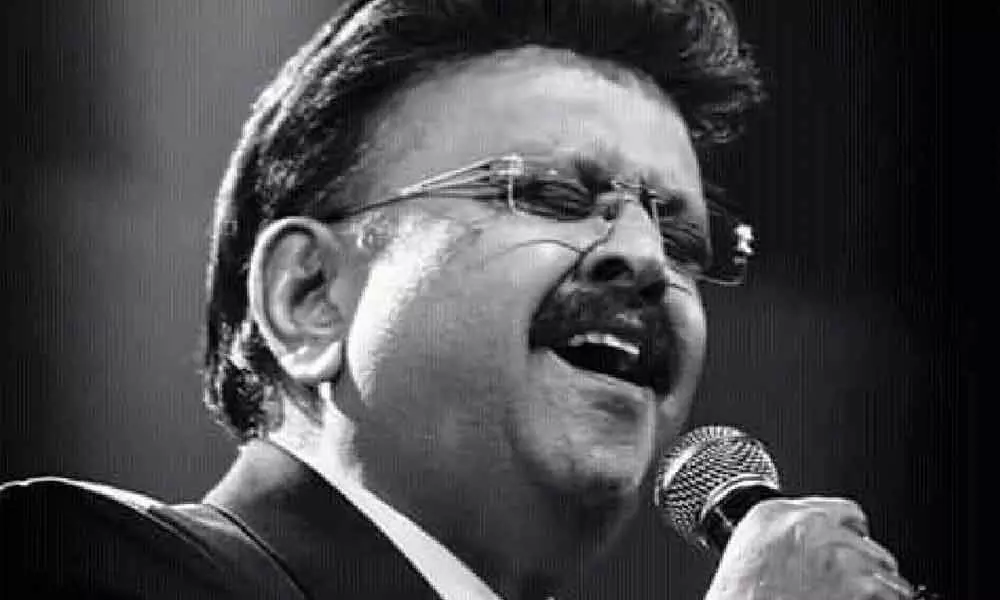My musical memories

SP Balasubrahmanyam
An era, and a spectacularly eventful one at that, came to an end a few days ago, when the legendary S.P. Balasubrahmanyam ,crooner par excellence, in Telugu primarily, and also in several other languages, breathed his last. Actor, conductor, director, singer and guru, all rolled into one, ‘Balu’ was an institution, all by himself.
An era, and a spectacularly eventful one at that, came to an end a few days ago, when the legendary S.P. Balasubrahmanyam ,crooner par excellence, in Telugu primarily, and also in several other languages, breathed his last. Actor, conductor, director, singer and guru, all rolled into one, 'Balu' was an institution, all by himself. His contribution, to the world of music, especially to the grooming of a whole generation of young singers and music directors, will forever remain etched in the memory of all music lovers.
I had the good fortune of meeting him on a few occasions. Once, at the Rajiv Gandhi International Airport, Shamshabad, when he was travelling to Chennai. And, on another occasion, again in Hyderabad, in Green Park Hotel, where he and I had separately gone to visit the legendary 'Bapu' cartoonist, and film director in a class of his own, and his inevitable companion the 'Telugu Wodehouse' Ramana.
I consider myself privileged and honoured to have been asked, recently, to participate in a Zoom meeting, organised by people from countries all over the world, to wish him well, when he was passing through a critical stage of illness. One prays to the Almighty to rest the departed Soul in peace.
In fact, it was in SP's most celebrated movie "Sankarabharanam" that the well-known Sanskrit Sloka 'Sisurvetti Pasurvetti Vetti Ganarasam Phanihi', occurred - about the appeal music enjoys among living beings - be they children, animals or even snakes.
Shakespeare also had the following to say about a man with no ability to enjoy music. "The man that hath no music in himself, nor is not moved with the concord of sweet sounds, is fit for treason, stratagem and spoils".
Music plays a great role in providing happiness in the busy, crowded and corrupted environment of the world in which people live today. In the din and bustle of day to day modern life, particularly in testing times such as the one which it is going through today, any source that soothes and comforts is welcome.
From times immemorial several activities have had such an impact on the emotional state of human beings. Physical exercise, engaging in mentally stimulating pursuits such as solving puzzles and riddles, engaging in established and ancient practices such as yoga or meditation, reading, watching a dance performance, listening to good music or sitting through a well enacted play, have all been known to have not only recreational value but to serve the purpose of diffusing mental tension and generally causing the mind to relax.
While many of these are within the reach of the normal person, some, like, for instance, music, drama or yoga may require one to acquire a taste for appreciating the value thereof. Personally, I must confess to being a practically complete philistine in terms of the ability to appreciate the fine arts or undertaking pursuits requiring discipline and training such as yoga.
By the grace of God I have been endowed with enough ability to appreciate good music, be it classical or light, Indian or Western! Before the reader reaches a hasty conclusion I must add a rider that I am not without the ability to enjoy good music, prose, drama or some selected games and sports.
And, given a tolerant and indulgent audience,
I have been known to play the guitar or croon the occasional song without inflicting too much pain on the listeners! My father, in fact used to say that my relationship with music was one more of enthusiasm than expertise!
It is music that I thought I should share some views with the reader about today. Music does not necessarily mean only singing or the melodious notes produced by instruments. It can be found in many day to day things which we are surrounded with. It is music, in fact, which first greets newborn infants as they enter this world.
Studies have shown that melodious lullabies can have the effect of soothing babies as well as their parents and even improve the children's sleeping and eating patterns while, simultaneously, decreasing the parents' stress.
Since ancient Greek times, music has been used to heal the mind and body. In fact, in native American culture, there are more than 1500 songs used for healing purposes. Music therapy has also been used for healing the sick and injured in the Armed Forces in many countries.
Scientific studies have also shown that cattle give more milk and plants grow more robustly when music is played to them. One learnt in the history lessons at school about Tansen, the great composer, musician and vocalist. Originally in the court of Raja Ramchandra Singh, he was invited to join Akbar's Court where he became one of the 'Navratna's (nine jewels), and was given the title of 'Mian' meaning a learned person. Although probably apocryphally, Tansen is credited with having perfected the singing of raga 'Megha Malhar' which, sung properly, could bring the rain, and 'Deepak', the raga of fire, which could not only set lamps alight, but also burn people to ashes.
I still remember how my grand-daughter Gayathri, when not even a year old and still crawling on the floor, would demand that we play Ganesha Pancharatnam Stotram 'Mudakaratha Modakam….' by M.S. Subbulakshmi. And interesting part was that when my daughter Aparna was pregnant and a number of Subbulakshmi songs were played apparently in the hope that the infant in the womb would benefit from it.
My affair with music started more than six decades ago in Chennai when I sang a song in the famous Rasika Ranjani Sabha. And, but for the occasional humming of a tune in friendly and social gatherings, my glorious singing career ended with singing the Kishore Kumar 'thandi hawa yeh chaandni suhani' during the golden jubilee reunion of the 1968 batch of the IAS at Mussoorie two years ago.
(The writer is former Chief Secretary, Government of
Andhra Pradesh)








